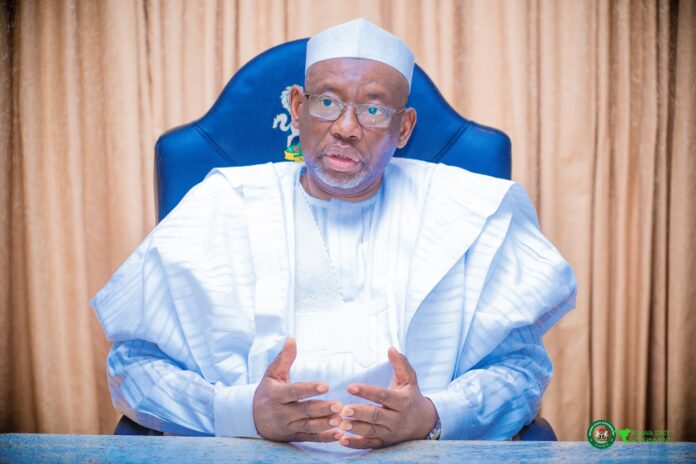Jigawa State is poised to be among the few selected states in Nigeria to receive special intervention from the federal government in an effort to address the state’s recurring flooding issues and other environmental and climate-related challenges.
This was made known when members of the House of Representatives Committee on Ecological Fund, led by the Committee’s Chairman, Hon. Aminu Sani Jaji, paid a courtesy call on Governor Mallam Umar Namadi at the Government House, Dutse.
The visit was part of the committee’s state tour, aimed at assessing the ecological challenges facing the state and exploring potential solutions to mitigate these issues as part of the Federal Government’s commitment to addressing climate change and promoting food security under President Tinubu’s Renewed Hope Agenda.
In his remarks, Hon. Aminu Jaji explained the significance of the visit, highlighting the various ecological challenges affecting Jigawa State, particularly desertification and flooding.
He praised Governor Namadi’s passion and efforts in tackling these challenges and emphasized the importance of selecting Jigawa as one of the key states for special ecological intervention, saying that the committee aims to shift from the traditional approach and focus on effective, timely, and sustainable land management practices to combat ecological issues.
“Your Excellency, the reason for our visit to Jigawa is to address the numerous challenges that plague our states, particularly in the northern region, and the immense ecological challenges that exist everywhere.” Not only because Jigawa is located among the Sahel states, but because of the challenges that are encountered in Jigawa state and the passion that you have in addressing such ecological challenges and some other biodiversity ecosystems that need to be addressed.”
Dwelling more on the devastating effect of the climate change effect on parts of the state, Hon. Jaji stressed the need for intervention from the centre as the issue is beyond the state government to shoulder.
“Year in year out, in this Hadejia-Nguru Waterland area, the challenges are too much. And the way many people are looking at it is like it will happen this year, and another year it will continue to happen without taking measures. It is something the state government cannot do alone; there must be an intervention. With such intervention, we took it very necessary to go to some states because addressing such challenges will add value to our food security and address the climate concern,” he said.
Jaji assured that the committee’s visit would yield positive outcomes for Jigawa State, with plans to recommend significant interventions to the Ecological Office.
“In this visit, we want to go to some selected areas within the state to see for ourselves, because during our inaugural address as the chairman of the committee, we said we were going to change it from the normal way of doing things to the correct and right way of addressing issues. Because we found out that the normal and usual way of doing things in the ecological office by far is not encouraging.”
Therefore, our goal is to address this matter accurately, rightly, and with urgency. So we are here in Jigawa, and we will make sure that Jigawa State partakes in and benefits from whatever resolution the committee at the National Assembly will have, and, insha Allah, it is going to be tabled before the Ecological Office, and soon the people of Jigawa State will reap the impact of this visit.”
Responding, Governor Namadi expressed his sincere gratitude to Hon. Jaji and the committee members for choosing Jigawa as a priority state for ecological intervention.
He outlined the severe impact of flooding on the state, referencing the devastating floods of 2022, which affected over 40,000 people, destroyed critical infrastructure, and led to the displacement of thousands of residents.
“Mr. Chairman, your choice of Jigawa State is not a misplaced priority. It is something that has been well thought out. You will agree with me that Jigawa State is one of the front-line states in terms of flooding in Nigeria. In 2022, the flood devastated this state to the extent that farmlands were washed away completely.
“More than 40,000 people were affected at that time. People in IDP camps, more than 12,000 were in IDP camps during that time. Not only that, but in terms of government infrastructure, we have almost lost about 19 roads as of 2022. As of today, we are still repairing some of these roads. About nine bridges were affected, and that is 2022.”
The Governor further explained that the current year has seen continued flooding, with 14 local governments already impacted, leading to significant losses in lives, homes, and farmlands.
He emphasized the urgent need for federal assistance, particularly in the area of environmental impact assessments for both federal and state road projects, which, when neglected, have exacerbated flooding issues in certain communities.
“As the chairman of the Ecological Fund, you need to look at the impact of climate change on people and also the impact of government projects. There is a serious need for the Federal Government to ensure that for all federal road projects, there must be an environmental impact assessment before they can be undertaken.”
He cited Kiyawa and Buji local government areas that experienced flooding, attributing this to the absence of an environmental impact assessment on the communities prior to the Kano-Maiduguri highway’s reconstruction. The road’s elevation above the towns prevented rainwater from exiting these areas.
“The need for environmental impact assessment by both federal and state road projects is very necessary. Otherwise, people will continue to be in agony over flooding,” he said.
Governor Namadi reiterated the state’s commitment to working closely with the Federal Government and the Ecological Fund Committee to ensure that Jigawa State receives the necessary support to address its ecological challenges effectively.
Hamisu Mohammed Gumel
Chief Press Secetary to the Governor of Jigawa State
August 20, 2024

